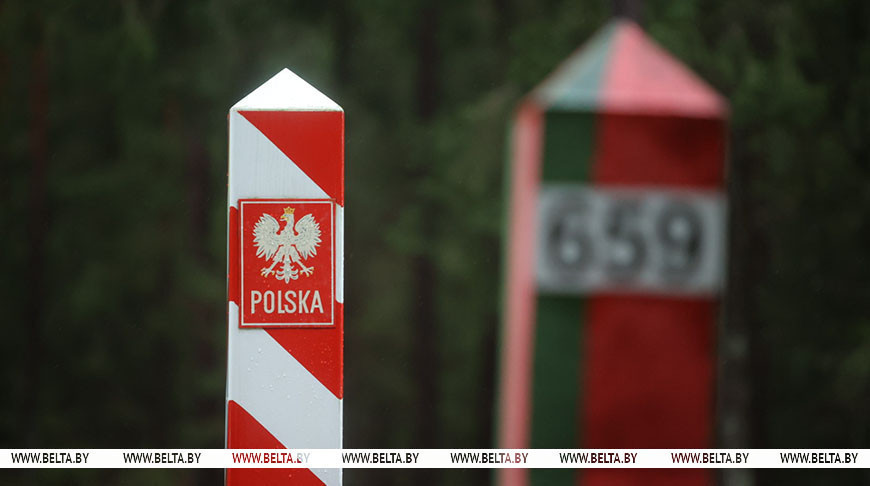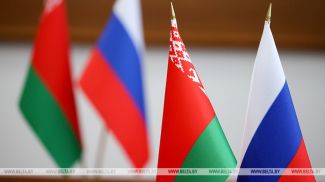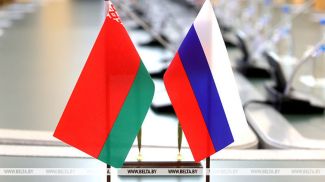
An archive photo
Minsk has officially invited Warsaw to jointly come to grips with the migrant crisis at the border. In order to resolve the crisis Polish President Andrzej Duda even traveled all the way to China. Warsaw claims it is extremely concerned about the penetration of migrants across the Poland-Belarus border, it sees this as a national security threat and demands that Belarus resolve the situation. Well, it’s time to see whether the Polish leadership really means it.
By proposing dialogue, Minsk actually put Warsaw in a dilemma. If the political elites of Poland act in good faith, this choice will be easy - Warsaw will accept Belarus' proposal. After all, the threat to national security is no joke, and in order to eliminate it, the authorities should use every opportunity that comes their way. Any excuses along the lines of “complicated political relations” will mean political immaturity of the Polish political establishment. If the Polish leadership rejects the proposal, it will automatically validate Minsk’s claims that the border crisis and tensions are being deliberately provoked and escalated.
In fact, this is not the first time that Belarusians have invited the Poles to jointly sort out the situation at the border. Yet, all Warsaw has done so far is throwing ultimatums and hiding behind the fence. It was impossible to embark on a meaningful dialogue in such conditions. However, today's situation is fundamentally different.
No matter what choice Poland is going to make, its decisions will be closely watched not only in Minsk, but also in Beijing - it’s not for nothing that the Poles went to China to complain about Belarus. Germany will also be keeping tabs on Warsaw. In general, the Germans are interested more than anyone else in resolving the migrant crisis. They made their position clear by introducing border controls with Poland and starting to push migrants out onto Polish territory.
Well, while Warsaw is trying to figure out how to untangle the web it has woven, we will recall why migrants ended up on the eastern border of the European Union, how Belarus and Poland were dealing with the migrant crisis on their own, and what scams Polish officials were engaged in. And, of course, we’ll have a look at what Minsk suggested doing in order to resolve the situation at the border.
Where did migrants come from?
Before getting to the heart of the problem, it is worth recalling how and why these migrants ended up at the Belarus-Poland border.
Europe faced a large-scale migrant crisis back in 2015. People from the Middle East and Africa fled to EU countries from wars and conflicts. By the way, many of these wars were unleashed with the participation of Europeans.
During the pandemic, migrant flows significantly dwindled. But not for long. In 2021, a surge in the number of migrants was reported along almost all the routes to the EU. It was quite predictable. The economic downturn made life in poor countries even harder. The world started talking about the rise of a hunger crisis. Meanwhile, European countries began to ease their pandemic-related restrictions. We should also mention the hasty withdrawal of Americans from Afghanistan, after which Afghans also had to flee, including to Europe and including through the territory of Belarus.
The year 2021 marked the beginning of a migrant crisis at the Belarus-Poland border. True, the Polish authorities now admit that Poland has been dealing with unprecedented migrant flows since 2015. And Belarus had nothing to do with it. The blame is entirely on the previous government.
According to the White Paper recently published by the Ministry of Foreign Affairs and the Ministry of the Interior and Administration of Poland, the situation with migrants spiraled out of control because of the uncoordinated actions of the Polish authorities who ran the country at that time.
Thus, the document admits that Polish work permits were issued to foreigners indiscriminately, without taking into account the priorities of Poland's foreign policy and security considerations, as well as the real needs of the Polish economy.
Visa market behind the Polish fence
It is worth noting that the White Paper was drawn for a reason. It was a response to a visa scam that Polish officials have been carrying out for years. We have published earlier a detailed piece about one of the largest corruption scandals in Poland's history.
In short, exploiting the migrant drama on the border with Belarus, the Polish authorities were covertly selling visas - $5,000 apiece. It turned out that a visa center in the Polish city of Lodz sold visas to citizens from several dozen countries, including Pakistan, Bangladesh and Iran. Deputy Minister of Foreign Affairs Piotr Wawrzyk was involved in the cash-for-visas scheme. He was removed from office.
Of course, it is highly doubtful that Wawrzyk could pull it off on his own. Keep in mind that back then former Prime Minister Mateusz Morawiecki and Chairman of the Law and Justice Party Jarosław Kaczyński were at the helm of power. So was President Andrzej Duda. A special commission will investigate whether any of the triumvirate was involved in the visa scandal.
In the meantime, more and more details of the visa fraud are coming to the surface. It turned out that the road to Josep Borrell's “Gardens of Eden of Europe” ran through Polish universities. Every year, thousands of foreigners, many of whom did not even finish school, received Polish student visas and then disappeared without a trace in the vastness of the Schengen zone. Everyone was okay with this situation for quite a while. Universities charged fake students tuition fees while foreigners legally entered the EU territory. Surely, there were those (from the highest echelons of power) who realized from personal experience that silence is gold. Literally.
A similar scheme was implemented for IT specialists. For example, the Poland. Business Harbor program, originally created to lure IT specialists from Belarus, was used by citizens of several dozen countries. However, having taken advantage of the simpler visa rules, only every seventh person reached Poland.
Desperate creativity Polish-style
All these years, very strange things have been happening behind the Polish fence. The Great Polish Wall, worth $370 million, was supposed to be a success story of the previous government. However, the new government learned that the fence was full of holes. Now the Tusk government intends to spend the same amount to make the "fence work."
In general, the new Polish government has a lot of entertaining ideas. Take for example the buffer zone introduced on the Polish side of the border with Belarus on 13 June. Warsaw claims that this zone is needed to protect the state border against migrants. Unauthorized persons cannot visit it for 90 days. This includes journalists and employees of humanitarian organizations, which raises suspicions. Particularly in conjunction with the news that the zone has been taken over by extreme right-wing organizations in Poland, who patrol the border forests in search of migrants. We talked about this in detail.
A week after the buffer zone was introduced, the Polish president came up with a new idea. Duda went on a visit to Beijing to discuss the situation at the Poland-Belarus border with Chinese leader Xi Jinping. The word “discuss” is perhaps not appropriate here. Rather, he tried to put pressure on Minsk by using their “influence” on Beijing. But this looks funny from the outside, while Warsaw seems to have really believed that such manipulations could work.
They didn't. The Poles made another attempt to influence the Chinese authorities by blocking railroad traffic at the terminal in Malaszewicze at the border with Belarus, a gateway for 90% of Chinese goods to the EU. The most interesting thing is that the blocking was reported by the Polish media rather than the government. At the official level, they merely informed us about “planned controls”. At the unofficial level - in diplomatic circles on condition of anonymity - they hinted at the deep ‘designs’ of this action. The Polish authorities wanted to force China to influence Belarus in this way.
Perhaps this was Warsaw's most desperate attempt in recent years. It’s not even about the scale of China, its capabilities for maneuver, or the fact that Poland's European partners - Germany and France, with whom the Tusk government is so eager to be friends - depend on transit. The fact is that the Polish elites have quite thoughtlessly put their own country's transit industry, their domestic enterprises and the well-being of their citizens on the line. It is even more surprising that the current prime minister is taking such steps. Tusk is known for his pragmatism.
On condition of anonymity, a Polish official told the South China Morning Post what came out of Warsaw's maneuvers. “We are pushing China to put pressure on Belarus, but apparently they did not understand our request and instead sent the PLA [People's Liberation Army of China] to Minsk,” the Polish functionary said, referring to the joint exercise of Belarus and China ‘Attacking Falcon’ that started in Belarus on 8 July. Just after Warsaw's manipulations.
What the figures say
As noted above, Belarus has repeatedly offered Poland to jointly deal with the situation at the border. Belarus has taken many steps to overcome the migrant crisis.
Let us take a look at the figures cited by the Permanent Mission of Belarus to the OSCE. “In 2019-2020 the number of migrants entering the EU through Belarus accounted for about 0.5% of the total number of migrants entering the EU through all routes, according to Frontex (the EU's external border security agency). In 2021 it actually increased to 4%, and over the past two years, thanks to numerous measures taken by the Belarusian side, it has decreased to 0.3% (that is, it became lower than it was before 2020),” the permanent mission reported.
It turns out that while Poland was building leaky fences and pushing migrants back to Belarus in violation of all international norms, Belarus was dealing with the migrant crisis on its own. But even now, when the flow of illegal migrants has fallen below the level of 2020, Warsaw, which has done nothing to solve the problem, continues to make demands to Minsk.
What is left for Belarus in this situation? To build a wall on its side? Preferably a blind one, so as not to see and not to hear. The temptation is great, but it would be immature. Belarusian leader Aleksandr Lukashenko once said: you do not choose your neighbors, they are given by God. We need to build relations with them. Therefore, we will have to be patient and try to cooperate.
The ball is in the Polish court
This week, Belarusian Minister of Foreign Affairs Maksim Ryzhenkov said that Minsk's position on the situation on the border had been communicated to the Charge d'Affaires of Poland in the Republic of Belarus. It is as follows: we are ready to receive any Polish delegation, any Polish experts, specialists, representatives of the leadership in order to look at the situation on the border together.
According to the Belarusian minister of foreign affairs, the situation has given rise to a huge amount of fake news in the West. They say that there are camps in Belarus that train migrants to cross the border illegally.
“If you know where these camps are, if you know any Belarusian law enforcers engaged in such actions, you are welcome to come and see for yourself whether it is true or not. We will provide you with access to any place on the territory of Belarus. And all these fake news will be taken away. Poland has refused the proposal,” the diplomat said.
Moreover, Poland started making political demands. Belarus considers such a situation unacceptable. “We invite any other organizations, representatives of the EU countries, who are here, to come to the border, to take a look at the situation, to hold talks, to discuss all necessary issues, and outline plans,” Maksim Ryzhenkov said.
According to him, a press briefing with the participation of law enforcement agencies and international organizations will be held on this topic closer to autumn. The issues of illegal migration and the situation on the Belarusian-Polish border will be discussed in detail.
The minister of foreign affairs stressed that Belarus is ready to discuss the situation on the border, but Poland shows no interest in solving the issue.
“The ball is on the Polish side. We are ready for dialogue, and the president is set on it. Apparently, Poland is not interested in solving this issue. And, probably, it is in its plans to continue escalating tensions on the border,” the minister said.
According to Maksim Ryzhenkov, the Polish authorities have been allocating a lot of funds to strengthen the country’s border. In his opinion, there is absolutely no need in fences, which even do not stop migrants.
“It is most likely that someone seeks to capitalize on such resources, to avoid constructive measures and solve issues by creating a new iron curtain. As our president says: when such huge amounts of money are allocated for unclear reasons, it is just a matter of time when another corruption scandal emerges,” the Belarusian minister of foreign affairs said.
Maksim Ryzhenkov described Poland's recent decisions on border with Belarus as hectic and patternless. “These actions bring nothing but huge inconvenience to carriers, among which are mostly Polish drivers (according to the decisions of the European Union), nothing but humanitarian problems for travelers, among whom are many children,” Maksim Ryzhenkov said.
According to the minister, Belarus has always been committed to building good-neighborly relations and cross-border cooperation. “In line with these approaches, we have always invited Poland to cooperate in resolving any issues that arise on our border. We share this border, and we are responsible for it together. Poland, however, uses every pretext to evade the implementation of our proposals,” the diplomat added.
Win or lose
So, what do we have today? Poland demands that Belarus resolve the migration crisis. Minsk says it is ready to discuss the situation and invites Warsaw to dialogue. Poland responds... with nothing. There is dead silence on the other side of the fence.
To be fair, Polish journalists did report on the proposal voiced by Maksim Ryzhenkov. In fact, the local media are repeating the same article featuring Belarus’ statement and Duda's allegedly successful visit to China.
“If you know where these camps are, if you know any Belarusian law enforcers engaged in such actions, you are welcome to come and see for yourself whether it is true or not. We will provide you with access to any place on the territory of Belarus. And all these fake news will be taken away. Poland has refused the proposal,” the diplomat said.
Moreover, Poland started making political demands. Belarus considers such a situation unacceptable. “We invite any other organizations, representatives of the EU countries, who are here, to come to the border, to take a look at the situation, to hold talks, to discuss all necessary issues, and outline plans,” Maksim Ryzhenkov said.
According to him, a press briefing with the participation of law enforcement agencies and international organizations will be held on this topic closer to autumn. The issues of illegal migration and the situation on the Belarusian-Polish border will be discussed in detail.
The minister of foreign affairs stressed that Belarus is ready to discuss the situation on the border, but Poland shows no interest in solving the issue.
“The ball is on the Polish side. We are ready for dialogue, and the president is set on it. Apparently, Poland is not interested in solving this issue. And, probably, it is in its plans to continue escalating tensions on the border,” the minister said.
According to Maksim Ryzhenkov, the Polish authorities have been allocating a lot of funds to strengthen the country’s border. In his opinion, there is absolutely no need in fences, which even do not stop migrants.
“It is most likely that someone seeks to capitalize on such resources, to avoid constructive measures and solve issues by creating a new iron curtain. As our president says: when such huge amounts of money are allocated for unclear reasons, it is just a matter of time when another corruption scandal emerges,” the Belarusian minister of foreign affairs said.
Maksim Ryzhenkov described Poland's recent decisions on border with Belarus as hectic and patternless. “These actions bring nothing but huge inconvenience to carriers, among which are mostly Polish drivers (according to the decisions of the European Union), nothing but humanitarian problems for travelers, among whom are many children,” Maksim Ryzhenkov said.
According to the minister, Belarus has always been committed to building good-neighborly relations and cross-border cooperation. “In line with these approaches, we have always invited Poland to cooperate in resolving any issues that arise on our border. We share this border, and we are responsible for it together. Poland, however, uses every pretext to evade the implementation of our proposals,” the diplomat added.
Win or lose
So, what do we have today? Poland demands that Belarus resolve the migration crisis. Minsk says it is ready to discuss the situation and invites Warsaw to dialogue. Poland responds... with nothing. There is dead silence on the other side of the fence.
To be fair, Polish journalists did report on the proposal voiced by Maksim Ryzhenkov. In fact, the local media are repeating the same article featuring Belarus’ statement and Duda's allegedly successful visit to China.
And that's it. Not a single comment from the Polish authorities in the media. Where is the proactive Duda? Where is the responsible Tusk? Where is Polish Minister of Foreign Affairs Radoslaw Sikorski, who is obliged to provide a response according to his rank?
Apparently, all these days the Polish authorities have been trying to figure out how to get out of the situation they have brought themselves into.
By refusing Minsk's proposal, Polish functionaries will at least fail the maturity test, demonstrating their incompetence and inability to solve the problem, which according to their own statements poses a serious threat to the country. At most, they will sign their name to lies, manipulation and deliberately inflating the threat of a migration crisis.
If Warsaw agrees, it risks not only saying goodbye to the migration saga, which has been so successful in getting both ordinary Poles and European partners distracted from the real situation. It will also deprive itself of the opportunity to direct the flow of money - either to build a fence on the border or to reinforce it. This is only what we can see on the surface. We don't even want to get into geopolitical intricacies, where Warsaw is only a nominal player.
Anyway, as the Belarusian ministry of foreign affairs stated, the ball is now in the Polish court. That means that Warsaw will have to choose whether to play by the rules or leave the field as a loser.
Belarus, on its part, has chosen openness and transparency. We say that our doors are open, despite the political and economic pressure on Belarus, attempts to hurt and discredit us. Today, the head of state supported the proposal to waive visas for citizens of 35 European countries traveling via all road and railway checkpoints. “Continuing to demonstrate the openness and peacefulness of our country, being committed to the principles of good-neighborliness, facilitating people-to-people contacts and improving freedom of movement, the Belarusian president has supported the proposal by the Ministry of Foreign Affairs and other state bodies to allow citizens of 35 European countries to enter, exit the Republic of Belarus through all road and railway checkpoints,” the Ministry of Foreign Affairs added. Well, the move speaks for itself.
Apparently, all these days the Polish authorities have been trying to figure out how to get out of the situation they have brought themselves into.
By refusing Minsk's proposal, Polish functionaries will at least fail the maturity test, demonstrating their incompetence and inability to solve the problem, which according to their own statements poses a serious threat to the country. At most, they will sign their name to lies, manipulation and deliberately inflating the threat of a migration crisis.
If Warsaw agrees, it risks not only saying goodbye to the migration saga, which has been so successful in getting both ordinary Poles and European partners distracted from the real situation. It will also deprive itself of the opportunity to direct the flow of money - either to build a fence on the border or to reinforce it. This is only what we can see on the surface. We don't even want to get into geopolitical intricacies, where Warsaw is only a nominal player.
Anyway, as the Belarusian ministry of foreign affairs stated, the ball is now in the Polish court. That means that Warsaw will have to choose whether to play by the rules or leave the field as a loser.
Belarus, on its part, has chosen openness and transparency. We say that our doors are open, despite the political and economic pressure on Belarus, attempts to hurt and discredit us. Today, the head of state supported the proposal to waive visas for citizens of 35 European countries traveling via all road and railway checkpoints. “Continuing to demonstrate the openness and peacefulness of our country, being committed to the principles of good-neighborliness, facilitating people-to-people contacts and improving freedom of movement, the Belarusian president has supported the proposal by the Ministry of Foreign Affairs and other state bodies to allow citizens of 35 European countries to enter, exit the Republic of Belarus through all road and railway checkpoints,” the Ministry of Foreign Affairs added. Well, the move speaks for itself.













